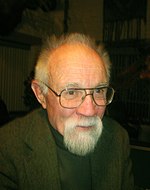Gustavus Simmons, Date of Birth, Place of Birth
TweetGustavus Simmons
American cryptographer
 Date of Birth: 27-Oct-1930
Date of Birth: 27-Oct-1930
 Place of Birth: West Virginia, United States
Place of Birth: West Virginia, United States
Profession: computer scientist, mathematician, cryptographer
Nationality: United States
Zodiac Sign: Scorpio 
About Gustavus Simmons
- Gustavus J.
- Simmons (born 1930) is a retired cryptographer and former manager of the applied mathematics Department and Senior Fellow at Sandia National Laboratories.
- He worked primarily with authentication theory, developing cryptographic techniques for solving problems of mutual distrust and in devising protocols whose function could be trusted, even though some of the inputs or participants cannot be.
- Simmons was born in West Virginia and was named after his grandfather, a prohibition officer who was gunned down three years before Gustavus was born.
- He began his post-secondary education at Deep Springs College, and received his Ph.D in mathematics from the University of New Mexico, Albuquerque. Simmons has published over 170 papers, many of which are devoted to asymmetric encryption techniques.
- His technical contributions include the development of subliminal channels which make it possible to conceal covert communications in digital signatures and the mathematical formulation of an authentication channel paralleling in many respects the secrecy channel formulated by Claude Shannon in 1948.
- In the 1980s, he helped found the International Association for Cryptologic Research (IACR).
- He is also the creator of the Ramsey/graph theory-based mathematical game Sim.At Sandia, Simmons was primarily concerned with the command and control of nuclear weapons, where the objective is to separate possession of a weapon from the ability to autonomously use it, something which should only be possible on receipt of an authenticated order from the National Command Authority, in using authentication to make possible the verification of compliance with various arms control treaties, and in the cryptographic aspects of verifying adherence to the Comprehensive Test Ban Treaty for nuclear weapons.
- In a review of Contemporary Cryptology (see publications), Don Coppersmith summarized the problem: Is the host substituting a false signal to mask the fact that it is continuing tests? Is the monitor really using the device to transmit other information than that allowed by the treaty? Who supplies the hardware? Can that person cheat?
Read more at Wikipedia
See Also
- Famous People's Birthdays on 27 October, United States
- Famous People's Birthdays in October, United States
- Famous computer scientist's Birthdays on 27 October, United States
- Famous computer scientist's Birthdays in October, United States
- Famous mathematician's Birthdays on 27 October, United States
- Famous mathematician's Birthdays in October, United States
- Famous cryptographer's Birthdays on 27 October, United States
- Famous cryptographer's Birthdays in October, United States

